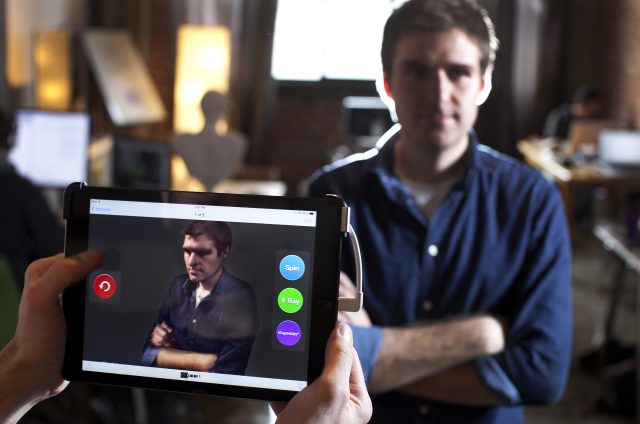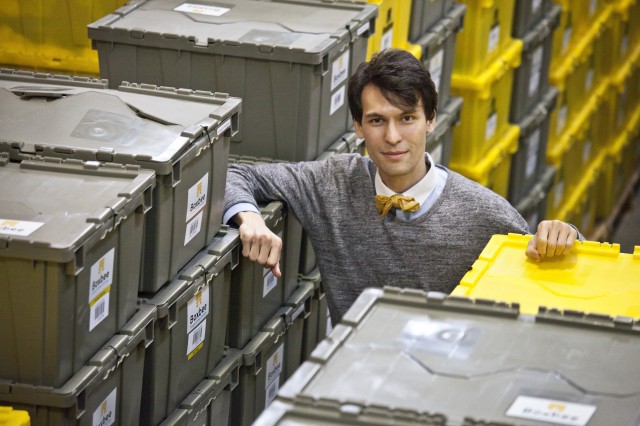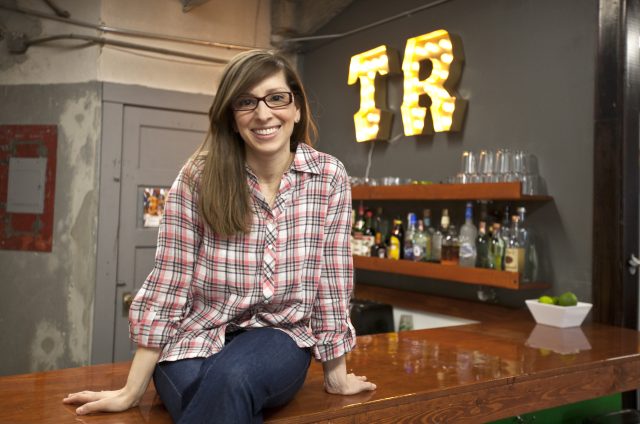
SAN FRANCISCO—If there’s one neighborhood in one city that continues to have an outsized influence on the tech world as a whole, it’s the South of Market (SoMa) district of San Francisco. It’s the home of Twitter, Yelp, Airbnb, and many others. This zone, which sits south of the city’s main commercial thoroughfare on Market Street, was originally built as a warehouse district to serve the adjacent waterfront. However, by the early 1990s, it was cheap real estate that was turned into lofts and startup offices.
While the startup economy may have crashed in 2001, it’s clearly back with a bang. Modern glass high-rises are going up everywhere, and they're competing for space with Square-enabled street food vendors. New bike-share stands have popped up in recent months. A major construction project, the Transbay Terminal, aims to be California’s answer to New York’s Grand Central Station when it's completed in 2017.
Lots of San Francisco entrepreneurs are trying to catch a piece of the dotcom boom's second wave, and as such, many have set up shop here. Out of all of them, Ars has selected five (in no order) SoMa CEOs that we think have the potential to shake up urban life well beyond their block.
Kristoph Matthews, Boxbee

CEO Kristoph Matthews’ office is in a larger shared space. His office, in fact, it's merely a desk inside Hatch Today, which describes itself as a “shared office experience.” Here, he gave Ars the pitch for his startup, which has already received an undisclosed amount in venture capital seed money.
“I grew up all over the world, I moved 22 times when I was a kid,” the 28-year-old told Ars. “I come from a family that can’t part with their stuff—ironically, I’m a minimalist. [And each time we moved] we had to figure out what to do with all the stuff. So I was familiar with the problem.”
That's where his startup, Boxbee, comes in: it's a company that aims to abstract away personal storage and make it on-demand from the convenience of a smartphone or Web browser.
“Boxbee is not a storage company—we're in the business of making urban living convenient for people," Matthews said. "If it’s something that one man can carry, we'll do it.”
The bee-themed startup sends large plastic bins to your door. Once you fill them, they’ll send a worker to go pick them up and take them to a secured storage facility. If you need a box back, you simply request it online. The price? It starts at $6 a month per box with free boxes and free pickups—deliveries are $15 plus $2 per box. For now, the service is only available in San Francisco and New York City. A box can be delivered anywhere in SF in under two hours and in NYC in 24 hours. Boxbee is currently storing thousands of boxes.
Originally, Boxbee was described as “cloud storage for the physical world,” but there was a slight problem: outside of the tech industry, the term “cloud storage” is pretty meaningless. So Boxbee now describes itself as "simple urban storage."
The inspiration for the company came when Matthews' parents, who live in Thailand, had to return to the United States just to retrieve an item they’d kept in storage. Matthews said that because of his memories of moving hassles, friends who come to visit his New York apartment often wonder if he’s just moved in. Similarly, he says that he prefers to give “experiences” (food, for instance) as gifts rather than physical objects.
The young CEO was trained as a mechanical and electrical engineer and spent the previous eight years working for various tech firms around the world, including most recently at Group4 Labs, a Silicon Valley-based semiconductor firm. But while he was hired to do engineering, he spent most of his time working on improving how the company moved its component parts around and shipping out final products.
“I just naturally really like logistics,” Matthews said. “I've always been fascinated by urban phenomena, how cities live, how to make living better. We help businesses and people manage their stuff better. They're accumulating more stuff no matter how the economy does. Something's gotta give.”
Still, Matthews has honed his sales pitch since he first started. “At the beginning we had a WordPress site where we didn’t even take credit card information,” he said. “It was just me and a ZipVan, going in between work hours.” At first, Matthews would show up at U-Haul stores with this pitch: “I'll buy those boxes for you if I can have 10 minutes of your time.” In turn, he would ask questions about what people were looking for in a moving or storage company. Of course, a random dude with a van isn’t the most trustworthy operation. But Matthews found the perfect audience: “Students are great early adopters, they're a little more trusting and they're moving a lot.”
In early 2014, Matthews said he’s ready to raise another investment round to help expand the company beyond its current nine employees. The goal is to further standardize the operation. "Taking things that are encased and shielded from the outside world, [to] stack things better—but also, minimizing the number of left turns," he said. "Real time load-balancing, we're implementing into physical form.”
Leah Busque, TaskRabbit

Like Matthews, TaskRabbit CEO Leah Busque wants to do nothing less than shake up the way people work. Her startup lets people hire others for short-term gigs online. So what’s next for the get-it-done crowd’s darling?
“Our vision is to really revolutionize the way people work on a global scale,” Busque said. “There’s so much opportunity and potential that we can realize: we are 20,000 in the US, can we empower one million people on the TaskRabbit platform to build out their own businesses? I think the uniqueness and the value-add is the in-person experience, particularly in an on-demand way. But that’s really the challenge that I want to solve: delivering in-person, on-demand. I think [our goal is] becoming a global company and expanding our categories and building out more categories across the platform and going deeper on those categories. For example: we have a certain number of handymen, can we [multiply them] 10 times for handymen in [a given] area?”
I’ve used TaskRabbit both personally and professionally, for tasks ranging from taking a package to the post office to hiring someone to pick up court documents and scan them for Ars. It’s worked out great each time, although sometimes I do wonder if it only exacerbates the problem of underemployed people, working as uninsured freelancers. The company takes an additional 20 percent after whatever the customer actually pays.
But Busque doesn’t have an issue with that: “I think the beauty of the site is that our rabbits get to decide how much their time is worth for different jobs.”
TaskRabbit is an older startup by local standards: it was first founded in 2008 and has raised nearly $40 million in venture capital. By now, the company is growing fast: in November 2013, TaskRabbit finally left the comfortable confines of the US, expanding into London.
“We have over 20,000 taskrabbits as part of our community across the US,” Busque said. “75 percent of them rely on [TaskRabbit] to pay their monthly bills. 10 percent do it as their full-time job, making up to $5,000 to $6,000 a month.”
TaskRabbit is similar to Boxbee, except that instead of just moving boxes, taskrabbits can be hired to do just about anything. You can hire someone to come mow your lawn, pick up your dry cleaning, or scuba dive to the bottom of a lake to find someone’s keys. Seriously.
“A taskrabbit is right now in Philadelphia driving to Sacramento for a company—one of their shipments was not going to make it on time, and they’re paying $2,000 for it,” Busque told Ars. “Where else would you go to get that done? This woman lost her keys in a lake and posted, and a scuba diver taskrabbit found her keys. She paid $150. This is what’s so exciting, when you are able to harness the skills and the power of people, anything can get done."
In contrast to its successes, the company had some struggles. Just last year, it had to let go possibly as many as 20 percent of its workforce in the summer.
“We realigned the company to support our key business opportunities, namely mobile, geographic expansion, business services, and our marketplace operations,” Busque told TechCrunch at the time. “We’re getting leaner in certain areas and expanding in others. I want to emphasize that TaskRabbit’s business is healthy and our growth remains strong. Since May of 2011, we have 11x’ed our monthly revenue and task posting volume, and several of our markets are consistently experiencing thirty percent month-over-month growth.”
One thing that most customers may not realize is that someone from the corporate headquarters in San Francisco may actually be fulfilling their task. The company encourages employees at all levels to go out into the field at least twice per quarter. And after six years, the company has learned a lot about its customer base both from offline and online analytics.
“IKEA furniture assembly is more popular here in San Francisco than in New York City, while Austin has more gardening—the East Coast has seen a lot of shoveling lately.” Busque said.
reader comments
76